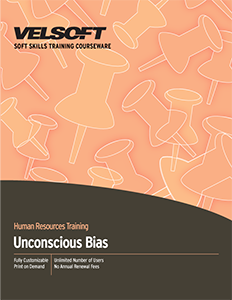Unconscious Bias Courseware
- Customizable teaching manual
- includes FREE student workbook
- includes FREE quick reference guide
- includes FREE PowerPoint slides
- AND additional teaching aids
- No annual renewal fees
- Unlimited reprinting rights
About Unconscious Bias Courseware
We make decisions based on knowledge, experience, personality and needs - what skill set must be recruited for your organization, for example, or getting a new car that fits your growing family. We also make decisions based on unseen preferences - where we grew up or lessons learned in childhood, for example. That favoritism may be a sign of unconscious bias. If unaddressed, unconscious bias can lead to decisions that unfairly discriminate against individuals and can harm workplaces through unfair hiring practices, lack of diversity, sullied reputation and missing out on recruiting the best candidates for the job.
This course will give you the information and tools to define and understand unconscious bias, identify potential biases in your personal life and in your workplace, and develop plans to reduce these biases.
For an initial overview of this solution, please watch this short video.
Sales and Marketing
Career Development
Supervisors and Managers
Human Resources
Workplace Essentials
Train the Trainer
Internet Marketing
Small Business Training for Entrepreneurs
Safe Food Handling
Digital and AI Essentials
Bundle and Save: Human Resources
Individual Courses- Anger Management: Understanding Anger
- Hiring for Success: Behavioural Interviewing Techniques
- Creating a Top Notch Talent Management Program
- Problem Solving and Decision Making
- Successfully Managing Change
- Conflict Resolution: Getting Along in the Workplace
- Building Better Teams
- Conducting Effective Performance Reviews
- Dispute Resolution: Mediation through Peer Review
- Stress Management
- Accounting Skills for the New Supervisor
- Orientation Handbook: Getting Employees Off to a Good Start
- Closing the Generation Gap in the Workplace
- Public Relations Boot Camp
- Appreciative Inquiry
- Transgender Employees: Creating an Inclusive Work Community
- Employee Recognition: Appreciating Your Workforce
- Cannabis and the Workplace
- Creativity in the Workplace
- Performance Management: Managing Employee Performance
- Business Succession Planning: Developing and Maintaining a Succession Plan
- Managing Customer Service
- Onboarding: The Essential Rules for Developing an Onboarding Program
- Understanding and Coping with the COVID-19 Pandemic
- Diversity, Equity, and Inclusion
- Unconscious Bias
- Intersectionality in the Workplace
SoftSkills DOWNLOAD
Receive instant access to SoftSkills training materials that are designed for trainers when teaching others.

